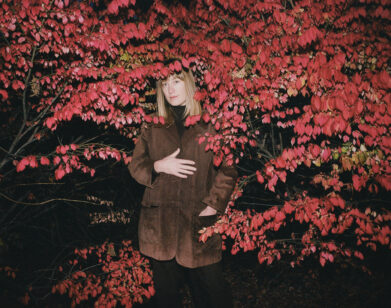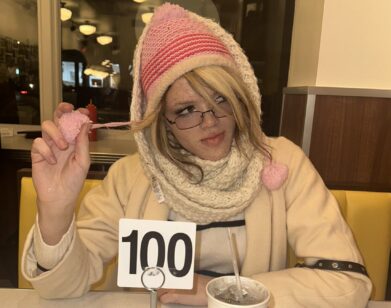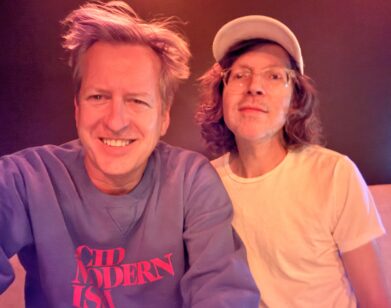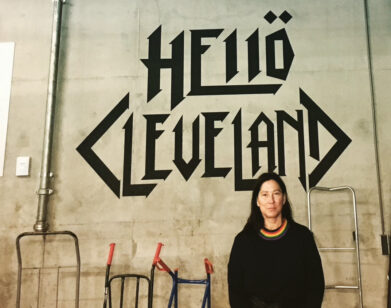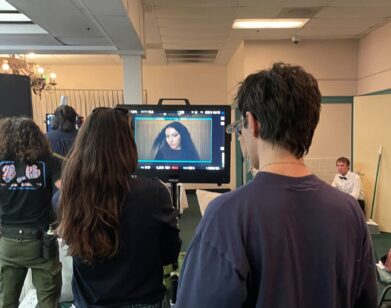Jenny Lewis and the New
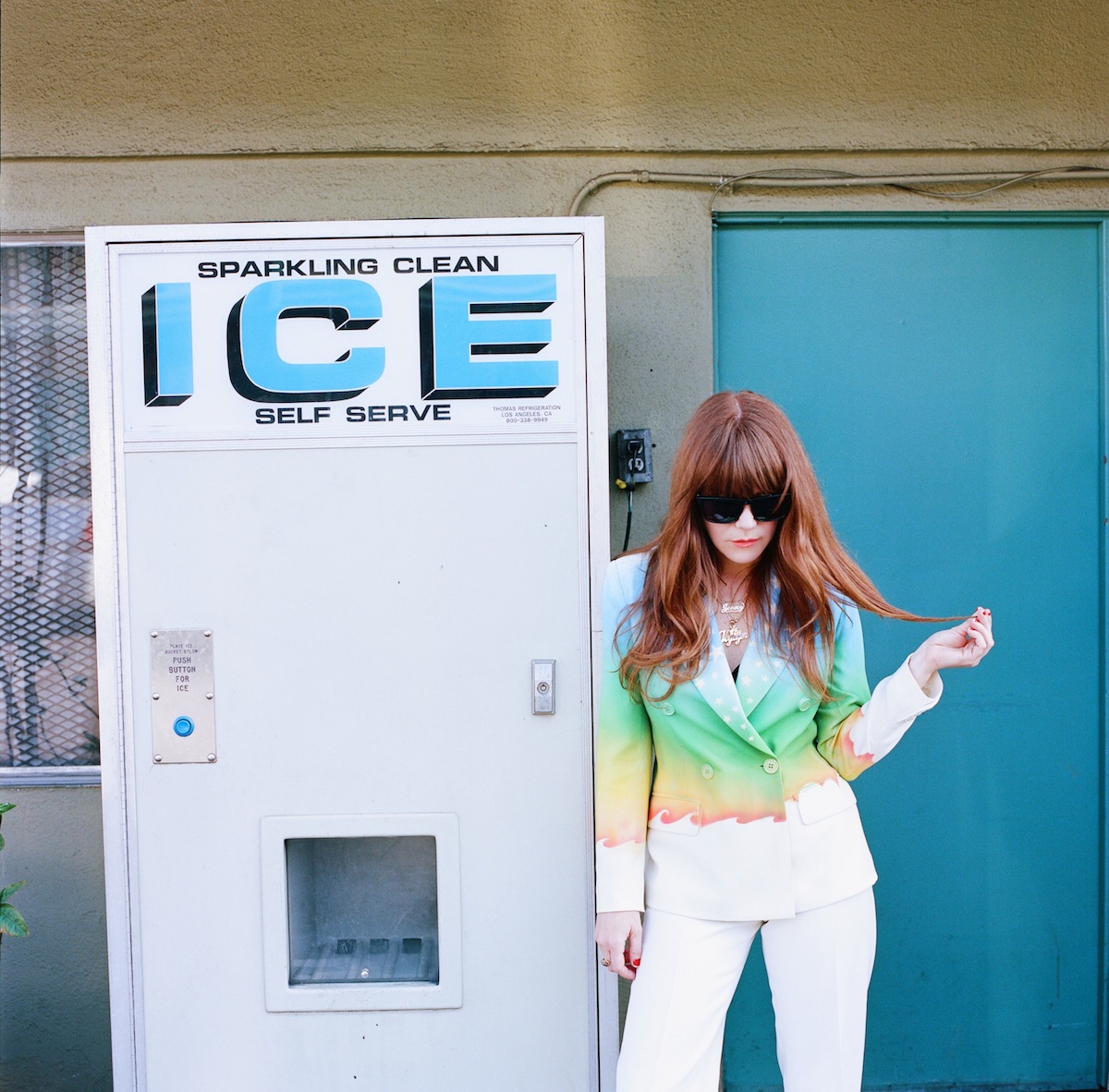
ABOVE: JENNY LEWIS. PHOTO COURTESY OF AUTUMN DE WILDE
Jenny Lewis has traveled many places musically throughout her career: the iconic songstress has been the leading lady to indie-rock band Rilo Kiley, one-half of Jenny & Johnny with Johnathan Rice, a music scorer; and this time she’s back as a solo artist.
Lewis’ first record in six years, The Voyager, tells a story of a difficult time for the singer. Over the past few years, Lewis has dealt with the passing of her father and the struggles that came with it, including bouts of insomnia. Lewis humorously portrays dealing with cultural pressures alongside these more personal struggles. Produced by Ryan Adams, The Voyager is full of great storytelling, optimism, and catchy rock jams. Lewis still has the ability to walk a fine line between reality and fantasy—creating songs that are both unforgettable and raw.
We spoke with Jenny Lewis about reuniting with Rilo Kiley, her rainbow pantsuit, and writing her own version of “Wonderwall.”
ILANA KAPLAN: So, to get right into it, where did you get that awesome rainbow pantsuit that is the photo art from The Voyager?
JENNY LEWIS: My friend Adam Siegel made it for me.
KAPLAN: It’s the shit.
LEWIS: I love it so much. It’s airbrushed directly onto the fabric. We wanted it to be graffiti Gram Parsons—like those famous nudie suits that Gram wore during the ’70s with a giant pot leaf and petals. We wanted it to be an updated version of that, with a little element of graffiti in there and ’90s hip-hop. I love it. I feel like a little, mini Elton John when I wear it.
KAPLAN: When I saw your pantsuit at Governor’s Ball, I fell in love with it.
LEWIS: It really helps me to get into the character of the record when I have a designated look. It just really simplifies things for me. For The Postal Service tour last year, we all talked about what we were going to wear and so that put me into the character of that music. This suit is so funny, I played in Boston a few weeks ago and I felt something behind me. I looked over my shoulder and there was a group of five-year-olds following me around. I’m like a party clown. [laughs] “Beat it, kids.”
KAPLAN: I love it. So, why was there such a big gap in between this record and your last?
LEWIS: I’ve been working on a lot of other projects, but I couldn’t quite get it together for my own record. When you make a solo record, it’s you. It’s your name. It has to be the right songs for how you feel. It just took me a really long time to get to a place where I felt comfortable with the material and the recording. Truly, Ryan Adams helped me through the process. We re-cut my entire album and really got me out of my own head and process. He really helped me finish it.
KAPLAN: Nice. So, what’s the theme behind The Voyager? It’s a bit different from your previous records, and it sounds a little more mature.
LEWIS: [laughs] Well, I guess I’m a little bit more mature. With this record, I didn’t have any rules. With my previous solo records, my band was still together, so I felt like I had to create something sonically that was different enough to warrant making a solo record. Rabbit Fur Coat was really stripped back and was a nod to gospel music. This one was really just about the songs. I wanted it to be produced. I needed help to make this one, and I was really open to Ryan’s suggestions.
KAPLAN: Cool. You’ve done everything. Do you prefer playing with a full band, scoring, or making a solo record?
LEWIS: I enjoy all different ways of making music. They’ve all come at opportune times for me. When I’m sick of myself and when I don’t know what to say as a solo artist, I can write a song for a movie. When I don’t know where to turn musically, being in a band—Rilo Kiley or Jenny & Johnny—the collaborative nature is really exciting. I’m really lucky that I have a lot of outlets for that for my songs.
KAPLAN: What’s your favorite song off of The Voyager—one you can’t wait for the world to hear?
LEWIS: I’m really excited about “She’s Not Me.” It’s the second song off of the record, and that was the first song I recorded with Ryan. It has a directness to it that I really love. I played it live a couple of times. No one has heard the studio recording with me. I can see women nodding, like, “Oh shit, I know how this feels.”
KAPLAN: I mean, your music has always been my go-to for emotional situations, so it makes sense.
LEWIS: We’re just going through it together.
KAPLAN: I guess so. What was it like touring with The Postal Service for the 10th anniversary? No one was sure that would ever happen.
LEWIS: We weren’t sure it was gonna happen, so it was amazing. It was one of the best experiences of my life. To be able to share that with Ben [Gibbard] and Jimmy [Tamborello] who are my dear friends and who I love so much, was truly remarkable. I was moved on a nightly basis. I have so much respect for Ben, and he’s my friend, but I’m really just a fan of his. He’s perfect every night: his pitch and his playing. He really makes a better musician out of me.
KAPLAN: That’s incredible. How do you think you’ve grown the most throughout your musical career? What musical influences have played into that?
LEWIS: I didn’t know anything about music when I started a band. I barely knew how to play a guitar. I didn’t know how to produce records. I learned how to play bass guitar and keyboards in Rilo Kiley. I picked up a lot from my collaborators. Every time I worked with someone new, I took away a little nugget of knowledge. I’m still learning, and I look forward to whomever it is I’m going to collaborate with next.
KAPLAN: Obviously you’ve really established yourself as a solo artist over the years and collaboratively. Do you ever see a reunion for Rilo Kiley in the future?
LEWIS: I don’t think it’s been long enough to talk about a reunion. It seems a little premature, but I would never say never to anything. I think that the possibilities are truly endless. Why would you shut the door on something that brought you so much joy?
KAPLAN: Will Ryan join you onstage, since he collaborated with you so much on this record?
LEWIS: I hope so. He’s a hard one to pin down. So, we’ll see. [laughs] I would be thrilled!
KAPLAN: How did you go about choosing The Voyager as the title for your record?
LEWIS: That was actually the last song I ever recorded for the record. It was actually an assignment that Ryan gave me. He told me to go home and write “Wonderwall.”
KAPLAN: That’s a huge ask. [laughs]
LEWIS: I know! I was like, are you fucking kidding me? “Wonderwall”? I can’t write “Wonderwall.” That’s a perfect song. That was my attempt at writing a power ballad. For me, it really sums up the feeling of the record. It’s just the journey of someone through a lot of shit. The record starts with “Head Under Water” and ends with “The Voyager.” Despite everything, “The Voyager” lands beyond the cosmos. At the end, the possibilities are infinite.
KAPLAN: A good life lesson. Does your boyfriend Johnathan Rice make an appearance on the record?
LEWIS: We produced two of the songs together: “Head Under Water” and “You Can’t Outrun ‘Em.” We wrote two together as well—one of which we submitted for an Anne Hathaway movie that we were writing the record for, but it got rejected so I took it back for this record. He plays and sings on a couple of tunes.
KAPLAN: I feel like your records as Rilo Kiley were a little angstier. Your music is still very girl-power oriented. Do you still feel as angsty when you write anymore?
LEWIS: I certainly still feel angsty, but I think that’s something you shed in your 30s, hopefully. I feel frustrated sometimes when I write about it. I’m different than I was. That’s why I don’t play some of those older songs, because they don’t really resonate with me anymore. Never say never.
JENNY LEWIS’ THIRD SOLO ALBUM, THE VOYAGER, IS OUT TODAY. FOR MORE ON THE ARTIST, PLEASE VISIT HER WEBSITE.

